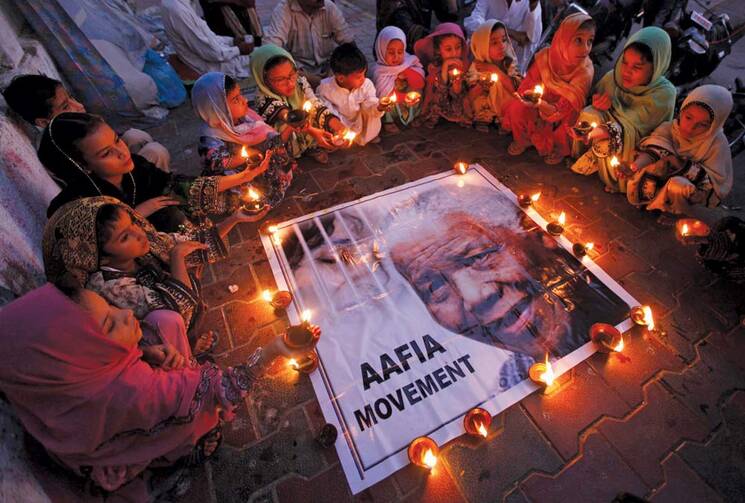As South Africans prepared for the memorial service for Nelson Mandela on Dec. 10, tributes from around the world poured in, acclaiming a man who steered South Africa away from certain conflict and through a slow, sometimes painful process of reconciliation—one that is in many ways ongoing.
Describing the remarkable achievements of a historic leader of the struggle against apartheid and the first president of a democratic South Africa, Archbishop Stephen Brislin, president of the Southern African Catholic Bishops’ Conference, said the nation owed a huge debt to Mandela. “If it wasn’t for Mandela, I don’t know what would have happened to this country, because we were certainly on the brink of civil war,” he said. “He stood up to people, very angry” over the repression of apartheid rule, people “who didn’t see the point of a negotiated settlement...and it must have taken enormous courage.” He said history would have taken a very different turn if Mandela “had allowed anger and hatred to rule his life.”
In a condolence message to Mandela’s family, Archbishop Brislin wrote that Mandela, who died on Dec. 5 at the age of 95, “never compromised on his principles and vision for a democratic and just South Africa where all have equal opportunities, even at the great cost to his own freedom.
“The greatest way we can acknowledge the life of Nelson Mandela is to strive for the ideals he cherished—freedom, equality and democracy—and to defend these ideals from those who would corrupt them.”
In a telegram to South Africa’s President Jacob Zuma, Pope Francis wrote, “Paying tribute to the steadfast commitment shown by Nelson Mandela in promoting the human dignity of all the nation’s citizens and in forging a new South Africa built on the firm foundations of nonviolence, reconciliation and truth, I pray that the late president’s example will inspire generations of South Africans to put justice and the common good at the forefront of their political aspirations.”
The retired Anglican Archbishop Desmond Tutu memorialized his fellow Nobel laureate as a man who showed a deeply divided nation how to come together. He downplayed rumors that South Africa would “go up in flames” in the wake of Mandela’s death, saying such talk discredits the late president’s legacy. “The sun will rise tomorrow, and the next day and the next,” he said. “It may not appear as bright as yesterday, but life will carry on.”
Archbishop Joseph E. Kurtz of Louisville, Ky., president of the U.S. Conference of Catholic Bishops, said: “In his struggle against apartheid rule, Nelson Mandela was a light for peace and equality in his country and for the whole world.... As president of South Africa, Mandela sought to undo the structures that marginalized and impoverished people—work Pope Francis is now challenging the entire world to imitate.”
U.S. Secretary of State John Kerry said in a statement that Mandela “rejected recrimination in favor of reconciliation and knew the future demands [that] we move beyond the past.... Today, people all around the world who yearn for democracy look to Mandela’s nation and its democratic constitution as a hopeful example of what is possible.”
Anthony Egan, S.J., a member of the Jesuit Institute of South Africa, in a remembrance published on America’s website on Dec. 5, said Mandela had been “both revolutionary and reconciler.” Even as he started the military wing of the African National Congress, he writes, Mandela “was willing to negotiate with the regime.”
“And in the 1990s, as he led the A.N.C. in the negotiated transition, he was nothing if not stubborn and resolute.” Father Egan adds, “His commitment to reconciliation was driven by his realistic assessment of the nation’s special circumstances. The A.N.C. had not seized power, but had negotiated a transition to democracy.... All South Africans had to find a way to coexist.”








